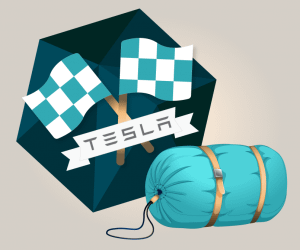By Les McKeown, CEO of Predictable Success
 Just about everyone was blown away when Tesla took in over 400,000 deposits for its recently announced Model 3 in a matter of days. That represents a staggering $17bn in future sales. Heck, even just the $1,000 deposit puts $400m in Tesla’s coffers.
Just about everyone was blown away when Tesla took in over 400,000 deposits for its recently announced Model 3 in a matter of days. That represents a staggering $17bn in future sales. Heck, even just the $1,000 deposit puts $400m in Tesla’s coffers.
The sales response was indeed astonishing, and seemingly puts some oomph behind CEO Elon Musk’s claim that Tesla will be selling over 500,000 new cars in 2018 and 1 million cars a year by 2020.
The reality, however, is somewhat different. Consider this:
– Two years ago, Mr. Musk said that by the end of 2015 his company would deliver cars at an annualized rate of more than 100,000 units. That level of production never materialized, and the company’s current forecast for 2016 is for 80,000 to 90,000 deliveries, with 50,000 to 60,000 expected in the second half of the year.
– During the first quarter of 2016, Tesla shipped 14,820 vehicles, not the 16,000 cars it had promised.
– It has had difficulties delivering units of its Model X because of problems with suppliers and, in their own words, “Tesla not having broad enough internal capability to manufacture the parts in-house.”
– It recently reported a first-quarter loss of $282m: almost twice that of the same period in the previous year.
– In recent months the company’s Vice President of Worldwide Finance, CIO, Production Vice President and Manufacturing Vice President have all left the company.
– Musk – the CEO – says he is spending so much time at the factory that he keeps a sleeping bag at the office.
– Possibly most worrying of all, Tesla is still seen by many financiers not as a mature operating company, but as “a cash-hungry start-up unicorn.”
This doesn’t sound like a company ready to scale. It sounds much more like a fast-growing startup about to hit Whitewater – a stage in every organization’s growth when the need for systems and processes takes precedence (for a while) over continuing innovation.
Whitewater is always a challenging time for highly Visionary leaders like Mr. Musk (just ask Reed Hastings, Brian Neeleman or Andrew Mason).
What does this mean for Tesla’s immediate future?
Expect to see any or all of the following:
– Seasoned industry executives brought in to fill operations and administrative positions.
– A dramatic retrenchment in innovation while they concentrate on wrestling with existing challenges.
– Frustration on the part of Mr. Musk, leading to either his stepping aside as CEO (possibly retaining some other, ‘CXO’-type position).
– Sale to another company.
One way or another, Tesla will only get to scalability by understanding something Evernote (for example) never got: the only viable strategy for a startup is to stop being one.
Les McKeown's Predictable Success Blog

Thank you for being the one to point out that the emperor has no clothes. I want Musk to succeed, as he is one of too few business leaders to dream big. The vehicle he is producing is brilliant. But the facts don’t add up. The investment community has bought the dream, and capital available to build the dream is gratifying. But a little perspective may be the best mitigation to making the dream come true without too much pain.
Hi Joe, So glad you enjoyed the article. It would be wonderful if Musk could achieve his vision for Tesla. It just may require much more than he’s willing to tolerate. Thank you for your comments! ~ Sarah, Community Manager, Predictable Success